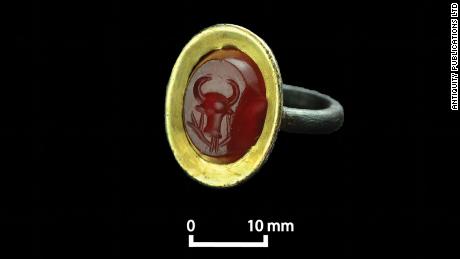Archeologists unearth lost town from East African empire

The buried settlement, which contains one of the oldest churches in sub-Saharan Africa, was inhabited for some 1,400 years before vanishing into the dusty highlands of northern Ethiopia around AD 650. Called Beta Samati, it was part of the Empire or Kingdom of Aksum, but prior to its discovery archeologists thought the area had been abandoned when the empire's ruling class set up its capital elsewhere.The Kingdom of Aksum ruled over the region between 80 BC to AD 825 and was one of the ancient world's major powers — conquering surrounding regions and trading with the Roman Empire, the researchers said. The kingdom converted to Christianity in the 4th century.It was only in 2009 when archeologists spoke to local residents in the area near the discovery, who suggested the researchers investigate a hill near the modern village of Edaga Rabu. It turned out to be a 25-meter high mound formed by waste and debris accumulated over generations of occupation. "It was part of the local oral tradition. They knew it was an important place but they didn't know why," said Michael Harrower, associate professor of archeology at Johns Hopkins University and lead author of the research, which was published in the journal Antiquity on Wednesday. Radiocarbon dating suggests people first started living in the town around 750 BC, and it remained occupied throughout Aksumite times, capturing key moments in Ethiopian history.The buildings and artifacts uncovered, which include a basilica, gold ring, coins, inscriptions and pottery, have revealed the region remained important throughout Aksumite times and the town of Beta Samati was a key hub of trade and commerce, linking the capital Aksum with the Red Sea and beyond.Today, the town lies near Ethiopia's border with Eritrea.
Radiocarbon dating suggests people first started living in the town around 750 BC, and it remained occupied throughout Aksumite times, capturing key moments in Ethiopian history.The buildings and artifacts uncovered, which include a basilica, gold ring, coins, inscriptions and pottery, have revealed the region remained important throughout Aksumite times and the town of Beta Samati was a key hub of trade and commerce, linking the capital Aksum with the Red Sea and beyond.Today, the town lies near Ethiopia's border with Eritrea.  "The Empire of Aksum was one of the world's most influential ancient civilisations, but it remains one of the least widely known," Harrower said. "Beta Samati spans Aksum's official conversion from polytheism to Christianity and the rise of Islam in Arabia," he added.The archeologists uncovered the remains of a large basilica dating back to the fourth century.
"The Empire of Aksum was one of the world's most influential ancient civilisations, but it remains one of the least widely known," Harrower said. "Beta Samati spans Aksum's official conversion from polytheism to Christianity and the rise of Islam in Arabia," he added.The archeologists uncovered the remains of a large basilica dating back to the fourth century. ![An inscription in Ge'ez or ancient Ethiopic found just outside the eastern basilica wall. It is thought to read: Christ [be] favorable to us.](https://cdn.cnn.com/cnnnext/dam/assets/191211080051-03-ethiopia-buried-town-discovery-scn-large-169.jpg) Such buildings were key early places of Christian worship in Ethiopia, the study said, and the site at Beta Samati appears to be one of the first in the Aksumite kingdom, the researchers said — built shortly after King Ezana converted the empire to Christianity during the mid-fourth century AD."That is what makes this discovery so important," said Aaron Butts, a professor of Semitic and Egyptian languages at Catholic University in Washington, DC, in an email."The archeological data combined with the radiocarbon dating suggest that the basilica stems from the fourth (or perhaps early fifth) century, making it certainly among the earliest known churches in sub-Saharan Africa. In addition, given the reliability of the archeological data combined with the radio-carbon dating, it seems to be the earliest securely datable church in Sub-Saharan Africa," added Butts, who wasn't involved in the excavation.Read More – Source
Such buildings were key early places of Christian worship in Ethiopia, the study said, and the site at Beta Samati appears to be one of the first in the Aksumite kingdom, the researchers said — built shortly after King Ezana converted the empire to Christianity during the mid-fourth century AD."That is what makes this discovery so important," said Aaron Butts, a professor of Semitic and Egyptian languages at Catholic University in Washington, DC, in an email."The archeological data combined with the radiocarbon dating suggest that the basilica stems from the fourth (or perhaps early fifth) century, making it certainly among the earliest known churches in sub-Saharan Africa. In addition, given the reliability of the archeological data combined with the radio-carbon dating, it seems to be the earliest securely datable church in Sub-Saharan Africa," added Butts, who wasn't involved in the excavation.Read More – Source



